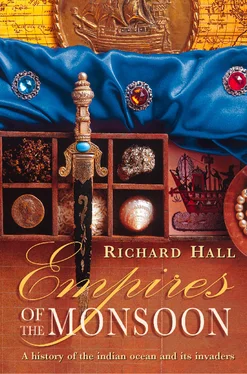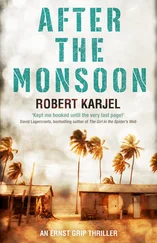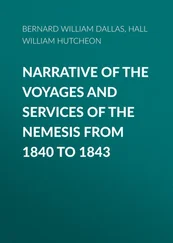However, Cape St Vincent was certainly a place to dream of deeds of chivalry, of felling the hordes of the ‘abominable sect of Mohamed’. So obsessed did the prince become with ideas of valour and piety that it was even said he had taken a vow of chastity. All around were reminders of the time, little more than a century earlier, when the Algarve was governed by Muslims. The queen heightened Henry’s visions by giving him what was said to be a piece of wood from the cross on which Jesus had died, and the king put him at the head of the Order of Christ, a religious and military society created in Portugal with the papal blessing in 1319. The Order of Christ replaced the discredited Knights Templars, and its purpose was to ‘defend Christians from Muslims and to carry the war to them in their own territory’. The Portuguese had already put their hands to this holy task, and it was to become the justification for all their bloodiest deeds.
Henry looked back fondly, as did his contemporaries in Lisbon, to the world of Charlemagne and the Arthurian romances, but was realistic enough to see that gunpowder, one of the inventions that had filtered across the world from China, was about to transform the arts of war. The formula for gunpowder had been widely known for at least a century (the English philosopher and scientist Roger Bacon possessed a ‘secret recipe’ as early as 1260), but the skills for exploiting it grew only slowly. At Ceuta and Agincourt in 1415, guns played no part, although earlier in the year the English had used primitive bombards, firing stone balls, when they successfully besieged the port of Harfleur. Guns were hard work to move in an age when roads scarcely existed, and their range was short, so on land they were as yet only effective in sieges, when the attackers had ample time to set them up.
The value of guns at sea was more quickly apparent. Once these cumbersome weapons were fixed to the deck, ready for action, the ship itself gave them mobility. The English, as a seafaring nation, pioneered the use of guns at sea – although they were too small to have much effect – during the battle of Sluys in 1340. A generation later, naval gunfire had grown more lethal: a Danish prince was killed by a stone ball shot from a German ship. Soon afterwards the Venetians began installing bombards in their war galleys, firing forwards over the bows.
Early in the fifteenth century the English were designing large ships armed with cannons. Some were built in Bayonne, the port in southwest France still held by Henry VI. His Portuguese namesake and kinsman would undoubtedly have been made aware of their potential, and by 1419 the Portuguese were able to deploy vessels armed with guns to deter a Spanish Muslim fleet sent to try and recapture Ceuta.
It is not known what first steered Henry’s thoughts towards the challenge of the Atlantic and the mysteries of Africa, for he was the most secretive member of a tight-lipped family. However, the improvements in ship design, combined with the advances in gunnery, were to bring consequences for Portugal which even he could never have dreamed of. History had portrayed Henry as a visionary; rather, he was ruthlessly ambitious. The exhortations of the Order of Christ for the launching of a holy war against the Muslims in their own lands merely bestowed on his ambitions the aura of sanctity.
At first, his interests lay close at hand. Only two days’ journey across the water from Cape St Vincent was Tangier. Although he might never be the king of Portugal, at least he thought he could make himself the viceroy of wealthy Morocco. To drive the infidels from it would be a sweet revenge for their eight centuries of rule in the Iberian peninsula. When his father, the king, rejected these schemes as too risky and vainglorious, the rebuff encouraged Henry to direct his thoughts beyond Morocco, across the desert to the ‘River of Gold’.
An Arab prisoner taken by the Portuguese gave some details of the trade routes across the deserts, and even told of lakes in the heart of Africa. Henry knew that Muslims would never let Christians go to the fabled Rio del Oro by land; but since the river presumably flowed into the Atlantic, it might instead be reached by following the coast of Africa southwards.
He kept courtiers around him who could be despatched on such missions in spring and summer, when the winds blew from the northeast. The prince had control of several ships, which regularly went on trading and fishing voyages from Sagres and Lagos. Most important were the documents he had collected about the vessels of those other nations which had tried to explore southwards, down the African coast. 4
The fate of the Vivaldi brothers of Genoa was well remembered. Men still wondered where their expedition had come to grief after it sailed through the Strait of Gibraltar in 1291 to search for a way around Africa to India. A Catalan map made half a century later bore an inscription saying that a certain Jaime Ferrer from Majorca had sailed past a Moroccan landmark known as Cape Bojador (at 26°N) where the shoreline was desert and the ‘Land of the Blacks’ began. Ferrer had also vanished without trace, and sailors claimed that any ship going beyond Cape Bojador – in Arabic Bon Khatar (‘Father of Danger’) – could never return. 5Several French fishing-boats from the port of Dieppe had also disappeared in those waters in more recent years. Superstitious people asserted that these adventurers had paid with their lives for sailing into the ‘Torrid Zone’, one of five climatic regions into which medieval geographers divided the world.
Henry’s pride was challenged by the activities of other nations on the African coast. The French, looking for new fishing grounds, seemed a particular threat, because as early as 1401 a party of French seamen had gone ashore near Cape Bojador in a small boat, captured some African villagers, then carried them back to the Canary islands. A year later a Norman knight, Jean de Béthencourt, occupied the Canaries and proclaimed himself king. 6The Castillans, who saw the islands ultimately as a prize for themselves, had encouraged him. The Portuguese tried to seize the islands, since they were strategically placed near the coast, but failed. Henry decided to push on southwards.
Year after year he sent his ships towards Cape Bojador. They were only small cargo vessels, little more than rowing boats with sails, and when they found themselves caught in strong currents they fled back towards Portugal. The main reward lay in plundering any Moroccan craft encountered along the coast. For fifteen years the prince sent his courtiers on these expeditions, and at last Cape Bojador was rounded. A squire named Gil Eanes sailed out into the Atlantic, to avoid the coastal currents, then made a landfall to the south of the fearsome cape. The Portuguese had at last touched the fringe of the ‘Land of the Blacks’. The year was 1434, almost twenty years after the first step into Africa, the capture of Ceuta.
THIRTEEN
Commanding the Guinea Coast
The city belong; to God.
—Prince Henry, when asked why Ceuta would not be exchanged for his brother Fernando, captured by the Moroccans (c. 1440)
FOR A WHILE, Prince Henry was diverted from exploring Africa’s coastline. King John was dead and his eldest son Duarte sat on the throne. A mild man, known as the ‘philosopher king’, Duarte gave way at last to Henry’s demands that Portugal should try to extend its power in Morocco by capturing Tangier.
The attack took place in 1437 and was a calamity. The army under Henry’s command was cut to shreds and his youngest brother, Fernando, was captured and taken as a hostage to Fez. These events so shocked Duarte that his health gave way and he succumbed to the plague the following year. The Moroccans offered to free Fernando if the Portuguese would evacuate Ceuta, but Henry scorned the suggestion. 1Although the captive prince sent pleading letters home, he was abandoned to God’s mercy and died after five years in a dungeon. The Portuguese proclaimed him a Christian martyr.
Читать дальше












